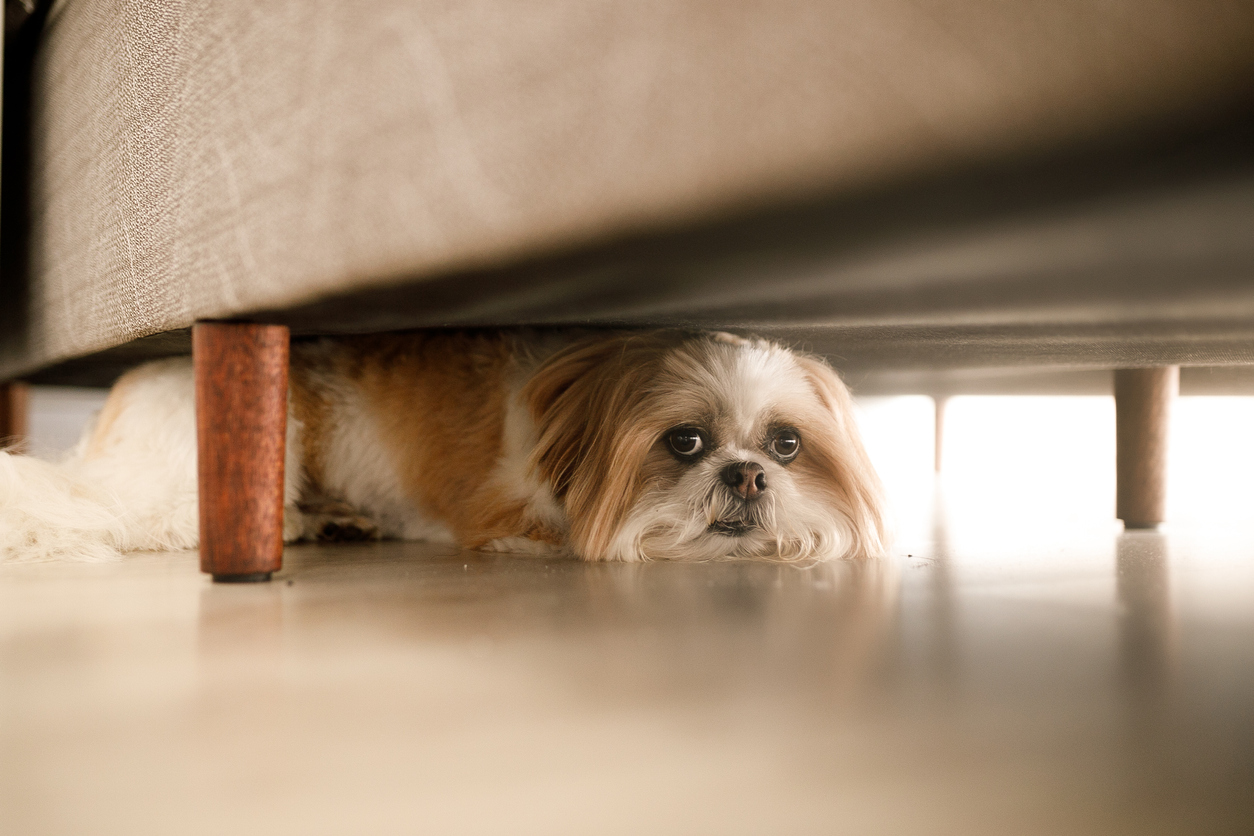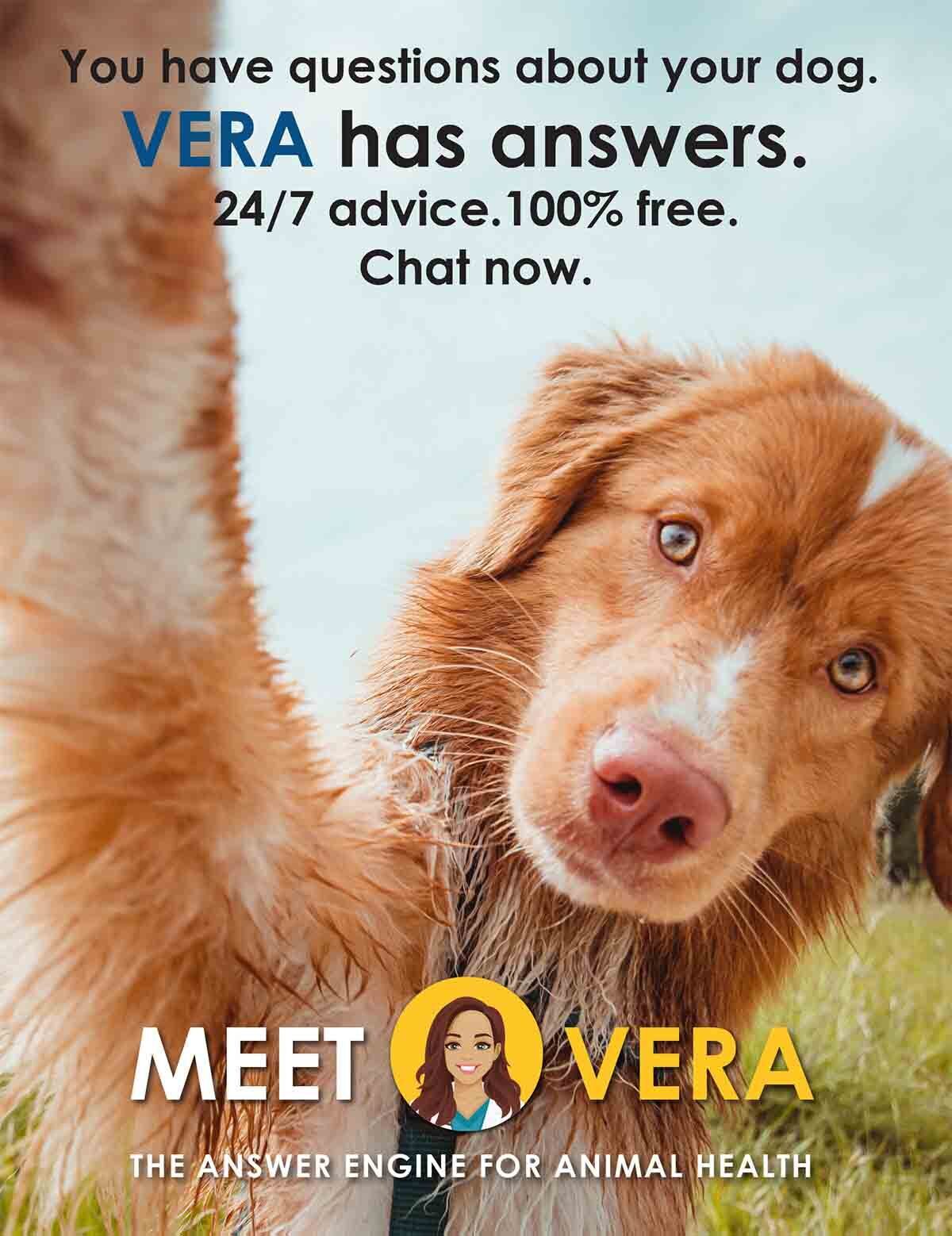Oh, say can you see…a dog who is terrified of fireworks? It’s that time of year again: humans celebrate our independence, and many of our dogs (and cats!) cower, tremble, and even destroy household items if they are terrorized by the loud random noises accompanying human celebrations.
At AskVet, we’re here to help you prepare for this noisy season! It’s best to have a plan ahead of the holiday and start to help your pet become accustomed to seeking a safe space in times of distress, decrease the noise he or she is hearing from outside, and obtain any needed medications or supplements from your family veterinarian.
Tips for What You Can Do at Home:
- Create a Safe Space for Your Pet—Every pet needs a spot to escape to where they can feel more secure. When avoiding the noises of fireworks or thunderstorms, that space is best if it is dark, quiet, and away from any windows. Bonus points if there are noise-cancelling features involved, such as lots of clothes (think of your cat seeking refuge deep within a walk-in closet!) or thicker walls (like a bathroom). Train your pet to “go to your safe space” and reward them with their favorite treat—or even a MORE special treat that only comes out during storms/fireworks! By prepping your pet to be in their safe space before anything scary happens, you can have your pooch or kitty ready BEFORE you expect the neighborhood noise to begin. This safe area should always be open and available to your pet, even when you aren’t home.
- Reduce the Noise—Although you can’t control how crazy your neighbors get with the banging and booming, you CAN control the noise that reaches your pet—to a certain extent, anyway! Try putting a white noise machine near your pet’s safe space, or turn a nearby TV on low volume, or even play some classical music through a nearby speaker. Mutt Muffs are a doggie earmuff device to reduce the noise, but will require training (using lots of treats!) to get your pup used to wearing them BEFORE the 4th of July.
- Comforting Your Pet—If your pet seems to derive comfort and exhibits calm behavior from seeking out contact with you, then please continue to comfort them! If, however, your soothing words and scratches only seem to make your pet more anxious, it’s best if you distract them with a favorite long-lasting treat in their safe space.
- Long-Lasting Toys and Treats—There are many different long-lasting treats, toys and puzzles on the market today. Figure out your pet’s favorite BEFORE the fourth—and then bring it to them in their safe space before you anticipate the fireworks to begin. This way, your pet’s brain is focused on something positive and distracting before and during the scary event. We like the Licki Mat and Kong’s various long-lasting treats and stuffers.
Consult Your Veterinarian:
- If your pet is terrified enough to urinate, defecate, or destroy household objects in their quest to escape scary noises, then he or she will almost certainly benefit from some pharmaceutical help from your family veterinarian.
- Some supplements can be used to “turn down the dial” on your pet’s anxiety and make it more difficult for them to reach the terror threshold—but supplements require several weeks of daily use to take effect. Different options that your veterinarian may recommend include Zylkene and Solliquin. A special food called “Calm” from Royal Canin also accomplishes the same goal, too.
- Ask your veterinarian if happy pheromones (chemical signals between animals that humans cannot smell) may help your pet. For cats, a product called Feliway is available in diffusers and sprays (perfect for their safe space!). For dogs, a product called Adaptil is effective and available in diffuser, spray, and collar formulations!
- Ask your veterinarian if short-acting anxiety medications or sedatives may be an option for your pet. For best results, these medications need to be administered one to three hours BEFORE anything scary starts, so make sure you understand your veterinarian’s instructions and follow them exactly.
- Make sure your pet is MICROCHIPPED before the holiday! Did you know that July 4th is the most common day of the year for pets to run away and go missing? A microchip is essential to reunite you with your beloved pet in case the worst happens and he or she escapes!
Whether you are celebrating at home or going out on the town to enjoy the Fourth of July show, we hope these tips save your pet from a scary evening of bangs and booms! Our AskVet team is here to help you navigate the stresses of an anxious pet. Please reach out to chat with us and our veterinary team 24 hours a day, 7 days a week!
Written by:
Allison Ward, DVM
Dr. Allison Ward grew up in the suburbs of Washington, D.C. and started working in veterinary hospitals when she was 14 years old. After graduating from veterinary school in 2011, she completed a small animal rotating internship in New Jersey, followed by a neurology/neurosurgery internship in Miami. After completing this advanced training, Dr. Ward then moved on to general small animal practice. Dr. Ward’s professional interests include feline medicine, neurology, and pain management. Her passion for educating pet owners carries over into her work with AskVet, and she loves being able to help pets and their parents at all times of the day (and night!). She currently resides in sunny south Florida with her two cats, Larry and George.






